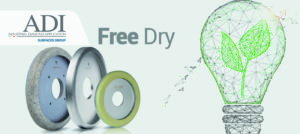FREE DRY by ADI: dry squaring gets greener and greener, thanks to environment-friendly binders
 Thanks to constant research work to design the most efficient ceramic tools solutions, during the first few months of 2020 the ADI engineers developed the new ADI Free Dry series of dry squaring Grinding Wheels.
Thanks to constant research work to design the most efficient ceramic tools solutions, during the first few months of 2020 the ADI engineers developed the new ADI Free Dry series of dry squaring Grinding Wheels.
In line with the company policy that has always delivered outstanding eco-sustainable solutions, that optimise production efficiency and energy savings, Free Dry Grinding Wheels are the evolution of the Dry line. They have been developed without using metals such as copper and aluminium, which prevent the subsequent reuse of the dusts generated by squaring processes in the formulation of new tile body mixes, and also complicate their disposal if required.
As the name tells us, Grinding Wheels in the Dry tools family are designed for the dry squaring of ceramic and stoneware materials, and finish the edge of the slab, removing surplus material, without using water. Dry grinding wheels guarantee a perfectly even, uniform surface that facilitates downstream procedures, enabling easy, quick, uniform installation of slabs and tiles, with minimal joints.
Dry processing cuts costs thanks to water saving, and by eliminating waste-water or sludge treatment or slab drying plants.
With the latest improvements introduced, the new ADI Free Dry line of grinding wheels is an evolution of the Dry line that offers even greater benefits:
- it delivers high technical performances in both grinding and chamfering, thanks to rapid, precise, effective stock removal.
- its raw materials do not contain metallic elements such as copper and aluminium, which may hinder the recycling of ceramic dusts within the production cycle.
ADI Free Dry is the next generation of dry squaring grinding wheels because, by permitting optimal reuse of dusts in mixes for the manufacture of new tiles, it completely eliminates disposal costs and enables major savings on raw material.
Moreover, even if the dusts are not reused, ADI Free Dry grinding wheels guarantee less environmental impact and much easier, cheaper disposal of the dusts, which are classified as standard inert materials thanks to the absence of these metals.


